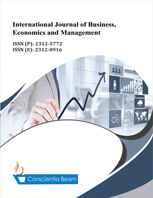Relevance of Stakeholders Theory, Organizational Identity Theory and Social Exchange Theory to Corporate Social Responsibility and Employees Performance in the Commercial Banks in Nigeria
DOI:
https://doi.org/10.18488/journal.62.2017.45.95.105Abstract
The study examine the perceived impact of corporate social responsibility in the Nigerian commercial banks in order to investigate the two constructs of independent and dependent variable one study objective was formulated as (i) To investigate if internal CSR practices have influence on employees’ performance in the Nigerian banks. A qualitative method was adopted for the study because flexibility in data gathering was essential to understand the internal CSR practices of the banks. The sample population for the interviews was directors and executives of CSR from the main six banks operating in Nigeria based on their per-capital shares and nationwide presence. The interview questions were opened ended in nature and structured based on the findings of literature on internal CSR and divided into sections. The Nvivo9 software was used to conduct the analysis of the data collected. The finding revealed that ta number of factors could contribute to the level at which internal CSR influence employee’s performance.

